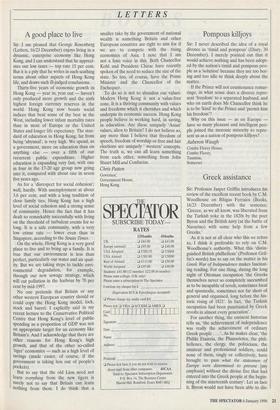LETTERS A good place to live
Sir: I am pleased that George Rosenberg (Letters, 16/23 December) enjoys living in a dynamic, enterprise economy like Hong Kong, and I can understand that he appreci- ates our low taxes — top rate 15 per cent. But it is a pity that he writes in such scathing terms about other aspects of Hong Kong life, and draws such ill-judged conclusions.
Thirty-five years of economic growth in Hong Kong — year in, year out — haven't only produced more growth and the sixth highest foreign currency reserves in the world. Hong Kong now boasts social indices that beat some of the best in the West, including lower infant mortality rates than in most of Europe or the United States and longer life expectancy. The stan- dard of education in Hong Kong, far from being 'abysmal', is very high. We spend, as a government, more on education than on anything else — over a fifth of our recurrent public expenditure. Higher education is expanding very fast, with one in four in the 17-20 age group now going into it, compared with about one in seven five years ago.
As for a 'disrespect for social cohesion'; well, hardly. With unemployment at about 3.6 per cent, and with a long tradition of close family ties, Hong Kong has a high level of social cohesion and a strong sense of community. Hence the fact that it has dealt so remarkably successfully with living on the threshold of turbulent events for so long. It is a safe community, with a very, low crime rate — lower even than in Singapore, according to the Straits Times.
On the whole, Hong Kong is a very good place to live and to bring up a family. It is true that our environment is less than perfect, particularly our water and air qual- ity. But we are taking steps to tackle envi- ronmental degradation, for example, through our new sewage strategy, which will cut pollution in the harbour by 70 per cent by mid-1997. No one pretends that Britain or any other western European country should or could copy the Hong Kong model, lock, stock and barrel. I explicitly said in my recent lecture to the Conservative Political Centre that Hong Kong's level of public spending as a proportion of GDP was not an appropriate target for an economy like Britain's. And I acknowledge that there are other reasons for Hong Kong's high growth, and that of the other so-called `tiger' economies — such as a high level of savings (made easier, of course, if the government is taking less out of people's pockets).
But to say that the old Lion need not learn everything from the new tigers is surely not to say that Britain can learn nothing from them. I do think that a smaller take by the government of national wealth is something Britain and other European countries are right to aim for if we are to compete with the rising economies of Asia, I note that I am not a lone voice in this. Both Chancellor Kohl and President Chirac have recently spoken of the need to reduce the size of the state. So too, of course, have the Prime Minister and the Chancellor of the Exchequer.
To do so is not to abandon our values. Modern Hong Kong is not a value-free zone. It is a thriving community with values and freedoms which it cherishes and which underpin its economic success. Hong Kong people believe in working hard, in saving, in education. Are these uniquely 'Asian' values, alien to Britain? I do not believe so, any more than I believe that freedom of speech, freedom of worship or free and fair elections are uniquely western' concepts. The truth is, we can all learn something from each other, something from John Stuart Mill and Confucius.
Chris Patten
Governor, Government House, Hong Kong


















































 Previous page
Previous page